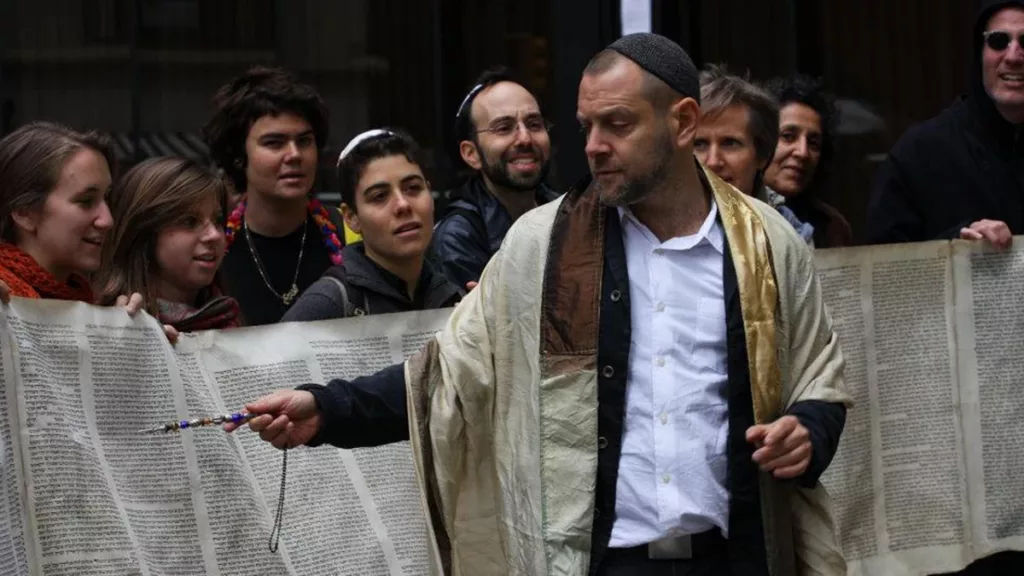Sandi DuBowski’s documentary Sabbath Queen tells the story of Amichai Lau-Lavie, a rabbi from an Orthodox Jewish family in Israel. Amichai comes from an incredible lineage, with over 38 generations of rabbis in his bloodline. But his path diverged from tradition in some ways. As a gay man, he struggled to reconcile that part of his identity with the strict rules of Orthodox Judaism he grew up with.
Seeking answers, Amichai moved to New York City, where he discovered freedom within the city’s LGBTQ community. But he didn’t turn his back on his faith; he founded an inclusive congregation called Lab/Shul that welcomed all. There, and through his drag persona, “Rebbetzin Hadassah Gross,” Amichai experimented with new approaches to Judaism.
Filmmaker DuBowski filmed Amichai over two decades, from 1997 to 2017, capturing his spiritual journey in vivid detail. We see Amichai grapple with questions around his faith, sexuality, and place in the Jewish world. Facing criticism from both conservatives and progressives, he endured real growing pains. Still, Amichai insisted on carving his own path.
In a surprising move, Amichai later enrolled in seminary to become a rabbi. But his goal wasn’t to uphold tradition; it was to challenge prejudices from within. The Sabbath Queen follows this unlikely journey, raising profound issues about what it means to be Jewish today. Through one man’s story, we witness deeper divisions emerging within the religion and how interpretations are evolving.
Ultimately, the film shows how Amichai stayed dedicated to his core values, even as opinions fluctuated around him. Sabbath Queen brings his journey to life over two absorbing decades, providing a timely examination of enduring questions at the heart of Judaism’s future.
Rebelling against Tradition
Growing up, Amichai was immersed in Orthodox Judaism. Born in Israel to a family with 38 generations of rabbis behind them, traditions and rituals defined his early life. But when the details of his private life were made public, everything changed. Forced to flee at a young age due to his sexual orientation, Amichai arrived in New York seeking a new path.
In America, he immersed himself in counterculture. The open communities of the city embraced Amichai and helped him accept all parts of his identity. He began experimenting with drag, developing a brassy alter ego that brought levity to dark themes in his past. Through friends like the Radical Faeries, Amichai blended his spirituality with new philosophies.
Determined to stay connected to faith, Amichai founded Lab/Shul. This congregation welcomed LGBTQ individuals and mixed religious observance with creative expression. Anyone could explore their beliefs free of judgment. As its rabbi, Amichai guided fellow queer Jews in reconciling religion with reality.
But after years of questioning, Amichai felt pulled to complete rabbinical studies. Enrolling sparked conflict; both his reformist endeavors and sexuality challenged tradition. While some progress had been made, conservative theology still marginalized voices like Amichai’s. Wrestling with generations of teachings took its toll.
Through it all, Amichai held true to his vision of inclusive Judaism. Despite turmoil, he served his community with distinction as the Sabbath Queen. By living openly while training in the heart of tradition, Amichai bravely redefined what it meant to be a rabbi while rebelling against the strict rules of his past.
Cutting Through Divisions
Sandi DuBowski took an ambitious approach with Sabbath Queen, following Amichai Lau-Lavie over two dynamic decades. From the outset, the filmmaker’s commitment to this longitudinal method pays off. We truly see Amichai’s journey unfold through varied life stages. DuBowski also ensures viewers grasp the full context, threading Amichai’s story with his fascinating family history.
This deeper understanding elevates the film. We learn not just about Amichai but also about the forces shaping him. Whether exposing his Holocaust-survivor lineage or recounting his father’s diplomatic career, such richness seeds empathy. Similarly, Benny Lau’s criticisms repeatedly cut through, prompting reflection on all perspectives. DuBowski presents contrasting opinions fairly, leaving space for nuanced thinking.
Stylistically, Sabbath Queen adopts a lively approach. Archival recordings transport us back in time, whereas animation offers metaphor. Momentum holds through raw vérité-style segments. Where some reviews criticize a choppy feel, I find this mimics Amichai’s unpredictable path. Difficult themes demand patience to unfold clearly, which DuBowski grants.
While ambitious in scope, the documentary feels remarkably cohesive. Through deft handling of political, religious, and personal details, DuBowski cuts through division to Amichai’s core journey. His directing brings understanding to urgent issues, demonstrating nonfiction’s power to build bridges where hatreds have grown.
Navigating Faith and Identity
Rather than focusing on geopolitics, Sabbath Queen delves into Judaism’s internal divisions. Amichai’s journey offers a lens on clashes between Orthodoxy and Reform over religion’s direction. Strict traditionalists believe preservation is key to survival, while progressives insist faith must flex with the times.
Caught between these polarized worlds, Amichai’s predicament feels symptomatic of Judaism’s identity crisis. His devotion clashes with his sexual orientation, representing a dilemma for many queer Jews. As Orthodox families swell, their surge in Israel empowers hardliners and marginalizes less conservative voices.
Amichai’s inability to fully accept or reject either position reflects broader struggles. Balancing tradition with lived reality proves immensely challenging when ingrained rules clash with who one loves or wishes to be. While Orthodoxy roots Jewish continuity in long-held norms, more open streams argue inclusion fosters faith’s future health.
By tracing how Amichai negotiates these divisions both within and outside institutions, Sabbath Queen probes questions at religion’s core. It explores what defines Jewish peoplehood amid changing social tides and competing claims over faith and community. Ultimately, the film suggests identity sits beyond rigid boundaries, rooted instead in authentic reconciliations of past, present, and self.
Threading History Through One Life
To grasp Amichai fully, Sabbath Queen delves into his remarkable lineage. Emerging from 38 generations of Eastern European rabbis, tradition coursed through his blood. But this lineage was nearly severed during the Holocaust. Amichai’s father survived the death camps as a boy, losing virtually his whole family except one brother.
This trauma colored his worldview and career as an Israeli diplomat. In diplomatic photos with Kissinger and Taylor, we see the serious, high-stakes work of ensuring Jews could build the future his forebears dreamed of. Amichai also showed early concern for others, protesting the Gaza conflict when few understood the Palestinians’ plight.
Thrown into sharp focus by archival footage, these protests take on renewed relevance today. Amichai faced ferocious backlash, yet his convictions shone through. His drag persona, a Kabbalist survivor rebbetzin, channeled trauma into healing through humor.
By weaving Amichai’s story with his family’s harrowing history, DuBowski grants vital context. We grasp how centuries of faith, near-genocide, and Israeli nationalist fervor shaped this man. And through one life, glimpses of Judaism’s passage across generations illuminate evolving beliefs. Amichai’s journey honors ancestry while carving new paths, threading history with hope.
Timely Questions for Changing Times
When first filmed two decades ago, could anyone foresee how searingly relevant Sabbath Queen would become? Scenes from Israel’s actions in Gaza seem ripped from headlines, showing conflicts continue troubling the region.
Amichai’s story resonates now, too. His dissent within the Jewish community’s most conservative quarters, seeking a truer path, mirrors wider societal tensions. While tradition demands strict rules, an evolving world insists on flexibility and fairness for all. Where does a revered faith fit when change knocks?
These probing questions give the Sabbath Queen biting commentary for its moment. The film urges its audience to consider religion not as a static monolith but as a journey—one requiring empathy on all sides. Amichai’s devotion to inclusivity, even amid obstacles, leaves hope for bridging divides. His persistence in carving space for dissent suggests wisdom in periodically challenging established ways and finding new approaches befitting each generation.
As faith and identity face transition, Amichai’s tale prompts thought. Sabbath Queen offers more than insight into one man; it raises probing issues about community, tradition, and cultural change that are likely to engage audiences for years to come. Amichai’s journey through Judaism’s divides resonates in a world grappling with its own internal tensions.
Finding Unity in Evolving Faith
Over two dynamic decades, DuBowski chronicles Amichai’s incredible journey with masterful care. Threading together a life’s intricacies demands immense patience, as skillfully realized here. By granting this long view, the Sabbath Queen illuminates deeper questions within an ancient faith.
Amichai’s story reminds us that identities evolve through a willingness to question settled rules. While tradition has anchored him since birth, his experiences stretched beyond prescribed boundaries. Reconciling all facets proved arduous but compelled growth. Through it, Amichai stayed devoted to fleshing Judaism’s canvas with those previously cast aside.
DuBowski’s film leaves hope that faith need not fragment but flex to shelter diversity within. As Amichai proves, change emerges not through shattering entire trappings but by grafting inclusion onto religion’s enduring roots. His example signals that theology flourishes when watered with lived realities rather than rigidity alone.
In chronicling one man’s eternal negotiation, Sabbath Queen makes a stand for softening the divide between text and true belief. Its legacy will endure through spurring understanding across differences within communities that are increasingly at odds. By capturing Amichai’s ongoing quest, DuBowski’s achievement ensures his message of flexibility within faith lives on.
The Review
Sabbath Queen
Sabbath Queen offers a profound portrait of one man's lifelong spiritual quest and its relevance to deeper questions within Judaism. DuBowski's masterful direction ensures Amichai Lau-Lavie's ongoing journey to reconcile faith, tradition, and identity through openness resonates long after viewers finish this enthralling documentary.
PROS
- Thoroughly researched with DuBowski's extensive longitudinal filming
- Offers profound insights into the reconciliation of faith and modern values through Amichai's story.
- Sensitively handled exploration of divisive issues within Judaism and LGBTQ identity
- Strong direction and editing immerse viewers in Amichai's journey
CONS
- Dense subject matter requires viewer investment but rewards engagement
- Snappy pacing presents some risks of losing narrative focus at times

















































Discussion about this post